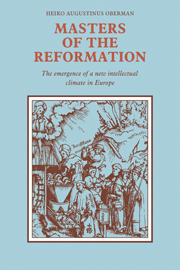Book contents
- Frontmatter
- Contents
- Preface
- Abbreviations
- Map
- PART I INTELLECTUAL RENEWAL
- PART II THE GRAPES OF WRATH
- PART III NEW JERUSALEM WITHIN THE OLD WALLS
- 10 Magistri and magistracy: the old and new masters
- 11 The great visitation: bishop and city
- 12 The onset of the Counter-Reformation
- 13 The Reformation: a German tragedy
- Student population at German universities 1385–1540
- Chronological outline
- Bibliography
- Index of names and places
- Index of modern authors
- Subject index
11 - The great visitation: bishop and city
Published online by Cambridge University Press: 07 October 2011
- Frontmatter
- Contents
- Preface
- Abbreviations
- Map
- PART I INTELLECTUAL RENEWAL
- PART II THE GRAPES OF WRATH
- PART III NEW JERUSALEM WITHIN THE OLD WALLS
- 10 Magistri and magistracy: the old and new masters
- 11 The great visitation: bishop and city
- 12 The onset of the Counter-Reformation
- 13 The Reformation: a German tragedy
- Student population at German universities 1385–1540
- Chronological outline
- Bibliography
- Index of names and places
- Index of modern authors
- Subject index
Summary
I the events of 29 January 1523 appeared to the Zurich Two Hundred as a special council session to which the representatives of the bishop and members of the academic community had been courteously invited, Zwingli approached that session with different expectations. He had come to participate in an ecclesiastical synod at which the clergy and the representatives of city and countryside had assembled to determine, on their own authority and with the aid of Zwingli's sixty-seven hurriedly composed theses, the specific content of the existing mandate to preach nothing that conflicted with scripture. The objections of the Constance delegation made it impossible to establish specific points of doctrine. Yet the ‘synod’ led to the emergence, perhaps even the discovery, of a new ecclesiology and left the local municipal congregation with a new sense of identity as the legitimate representative of the universal church.
In contrast to the now commonly accepted thesis of Emil Egli, our analysis has shown that the council did not decree complete freedom of preaching but merely sought to standardize the teaching issuing from Zürich pulpits. For the interim, ‘Gospel’ or ‘evangelical’ meant no more than ‘that which is defensible from holy scripture’. Zwingli thus had grounds for disappointment at the outcome on 29 January. The council declined to elevate his theology to the standard for Zürich's Gospel. In the absence of objections from the assembly, the council did clear Zwingli of any taint of heresy.
- Type
- Chapter
- Information
- Masters of the ReformationThe Emergence of a New Intellectual Climate in Europe, pp. 210 - 239Publisher: Cambridge University PressPrint publication year: 1981

